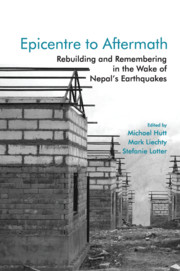4 - Labour and the Humanitarian Present: Thinking through the 2015 Nepal Earthquakes
Published online by Cambridge University Press: 08 July 2021
Summary
Labour offers an important arena for studying the creation of aftermaths in the wake of disaster (see Liechty and Hutt, this volume). In this chapter, we track the collective agencies that shaped post-disaster labour upheavals and transformed socioeconomic relations in Dolakha district of central Nepal, one of the regions hardest hit by the 2015 earthquakes. The upheavals included a rapid, large-scale displacement of labourers at the site of a major infrastructure project, alongside massive increases in demand for labour to carry out reconstruction work—dynamics that, in turn, contributed to a significant and widely reported increase in wage rates. These seemingly ‘natural’ fluxes in supply and demand were also shaped by politics and agency, as various intermediary actors with interests at stake intervened to shape both pre- and post-disaster labour markets. The chapter highlights struggles among intermediaries for control over wages, efforts to exploit differences between sectors and among labourers, and the different implications for those trying to rebuild homes and livelihoods in the wake of the disaster.
Much of the critical analysis of humanitarian relief and reconstruction following the earthquakes has centred on the failure of the Nepali state to respond effectively. Amnesty International (2017) underscores the role of state-led reconstruction works in exacerbating processes of marginalization. Yogesh Raj and Bhaskar Gautam (2015) specify the deliberate negligence of an ‘amnesiac state’ that ‘remembers to forget’ existing data and information that could support the distribution of aid—lest it face the demands ofaccountability (see also S. Tamang 2015). Similarly, there have been ample accounts of donor complicity in the chaos and inequities surrounding both relief and reconstruction (for example, Bhattarai, Acharya, and Land 2018). Others have analysed the post-earthquake dynamics in Nepal through the lens of disaster capitalism, emphasizing how disasters can offer new opportunities for capital accumulation while extending processes of commercialization and financialization deeper into agrarian subsistence economies (D. Paudel 2017; Paudel and Le Billon 2018; Matthew and Upreti 2018; Le Billon et al. 2020; Paudel, Rankin, and Le Billon 2020). Recent scholarship has also explored everyday relations of expertise from the perspective of residents as well as the cadres of professionals and relief workers dispatched to affected areas (Limbu et al. 2019; see also chapters by Shneiderman et al.; Baniya; Gurung and Baniya; Oven et al.; Dhungana; Shakya; Ninglekhu, Daly, and Hollenbach; Lotter, this volume).
- Type
- Chapter
- Information
- Epicentre to AftermathRebuilding and Remembering in the Wake of Nepal's Earthquakes, pp. 87 - 109Publisher: Cambridge University PressPrint publication year: 2021
- 1
- Cited by



